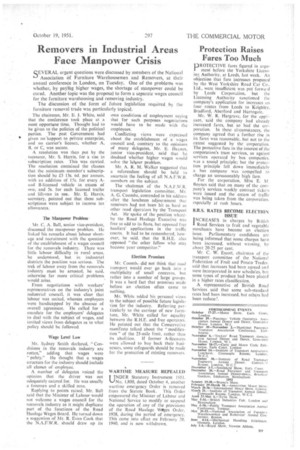Removers in Industrial Areas Face Manpower Crisis
Page 43

If you've noticed an error in this article please click here to report it so we can fix it.
3EVERAL urgent questions were discussed by members of the National Association Of Furniture Warehousemen and Removers, at their annual conferene-e in London, on Tuesday. One of the problems was whether, by paYhig higher wages, the shortage of manpower could be cured. Another topic was the proposal to form a separate wages council for the furniture warehousing and removing industry.
The discussion of the form of future legislationrequired, by the furniture removal trade was particularly topical.
The chairman, Mr. E. J. White, said that the Conference took place at a most opportune time. Thought had to he given to the policies of the political parties. The past Government had given no -support to private enterprise, and no carrier's 'licence, whether A, B, or C, was secure.
A resolution was then put by the treasurer, Mr. S. Harris, for a rise in subscription rates. This was carried. The resolution contained the clauses that the minimum-member's subscription should be £3 13s. 6d. per annum, with an addition of 15s. for every Aand B-licensed vehicle in excess of one, and 5s. for each licensed trailer and lift-van in used Mr. E. Harris, secretary, pointed out that these subscriptions were subject to income tax allowances.
The Manpower Problem'
Mr. C. A. Ball, senior vice-presideot, discussed the manpower problem. lie linked his remarks about labour shortage and recruitment with the question of the establishment of a wages council forthe removals industry. There was little labour 'difficulty in rural areas, he understood, but in industrial districts the position was serious. The trek of labour away from the removals industry must be arrested, he said, otherwise far more critical problems would arise.
From negotiations with workers' representatives on the industry's joint industrial council, it was clear that labour was united, whereas employers were handicapped by the absence of overall agreement. Ile called for a mandate for the employers' delegates to deal with the subject of wages, and invited views from delegates as to what policy should be followed.
Wage Level Low Mr. Sydney Smith declared, " Conditions in the removals industry are rotten," adding that wages were "paltry." He thought that a wages structure for the industry should include all classes of employee.
A number of delegates voiced the opinion that the driver was not adequately catered for. He was usually a foreman and a skilled man.
Replying to points raised, Mr. Ball said that the Minister of Labour would not welcome a wages council for the removals industry as it might duplicate part of the functions of the Road Haulage Wages Board. He turned down a suggestion of Mr. R. Evan. Cook that the N.A.F.N,V.R. should draw up its own conditions of employment saying that for such purposes negotiations would have to be made with the employees.
Conflicting views were expressed about the establishment of a wages council and, contrary to the opinions of many delegates, IVIr. E. Haynes, junior vice-president, said that he doubted whether higher wages would solve the labpur problem.
Mr. A. R. M. Walker suggested that a referendum should be held to ascertain the feeling of all N.A.F.W.R.
members on the subject. .
The .chairman of the N.A,F.W.R. transport legislation committee, Mr. A. G. Coombe, contended in his address after the luncheon adjournment that removers hag not been hit as hard as other road operators by the Transport Act. He spoke of the position whereby the Road Haulage Executive was free to add to its fleets, but opposed free hauliers' applications in the traffic courts. It had to be remembered, however, he said, that the R.H.E. also opposed "the other fellow who may become your competitor."
Election Promises
Mr. Coombe did not think that road transport would ever go back into a multiplicity of small concerns, but rather into a number of large groups. It was a hard fact that promises made before an election often came to nothing.
Mr. White added his personal views to the subject of possible future legislation for the industry. Referring par. ticularly to the carriage of new furniture, Mr. White called for equality between the R.H.E. and free operators. Ide pointed out that the Conservative manifesto talked about the " modification " of the 25-mile limit, rather than its abolition. If former A-licensees were allowed to buy back their businesses, some safeguards should be made for the protection of existing removers.




































































































